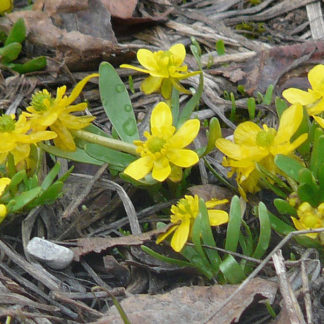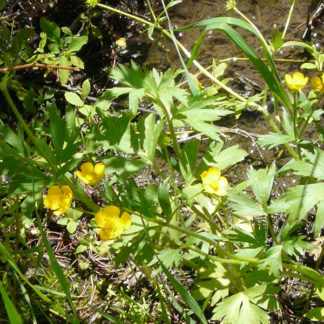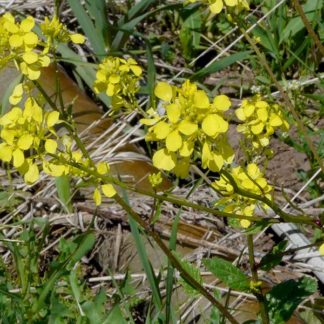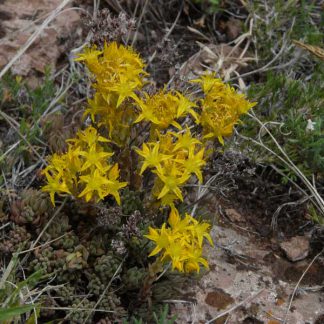Yellow
Showing 73–84 of 100 results
-

Ranunculus glaberrimus / sagebrush buttercup
- one of the earliest spring flowers
- yellow flowers, ca. 1" across
- usually 5 shiny/waxy petals, numerous stamens
- short, mostly elliptical leaves
- in small to field-sized clumps
- very poisonous
-

Ranunculus orthorhynchus / straightbeak buttercup
- 5 (to 8) bright, shiny yellow petals with long pedicels
- many stamens and pistils
- large, compound leaves with 3-5 pointy-lobed leaflets
- found in wet areas including irrigation ditches
-

Rhamphospermum arvense / Charlock
- yellow-flowered brassica; flowers larger than most mustards
- large-ish leaves with toothed margins
- erect stems; look for a reddish purple ring at stem junctions
- disturbed areas, road sides and waste places; prefers high nutrients
- 1" siliques point out or up, but not down
-

Ribes aureum / golden current
- shrub up to 10 feet tall
- spring bloomer, golden yellow flower in clusters
- small, maple-like leaves
- 1/2 inch berries in late summer, golden to black
-

Scrophularia lanceolate / lanceleaf figwort
- teeny, snapdragon-like flowers
- flowers urn-shaped, mostly yellow, with red or green at the tips
- flowers look like they aren't yet opened
- flowers on elongated panicle at the top of a tall-ish plant
- opposite leaves like stinging nettle without the stingers
- up to 5 feet tall in full sun/partial shade
-

Sedum lanceolatum / lanceleaf stonecrop
- bright yellow, star-shaped flowers (possible red tinge)
- fleshy/succulent, small leaves (green, yellow or red)
- open rocky outcrops, gravelly sites
- drought tolerant
-

Senecio integerrimus / tall western groundsel
- early spring to early summer, often with larkspur
- bright yellow flower head with several, disheveled looking blossoms
- only 5-13 ray florets (petals)
- cobwebby hairy basal leaves, especially when young
- seasonally moist areas, from sagebrush to higher parts of the fen
-

Senecio triangularis / arrowleaf ragwort
- leafy stems with arrow-shaped, coarse-toothed leaves
- often in large patches on moist soil
- clusters of yellow flower heads, each with 8-ish untidy ray florets
- numerous green involucral bracts, sometimes with black tips
- largest leaves occur mid-stem
-

Shepherdia canadensis / Canadian buffaloberry
- deciduous shrub, opposite branches and leaves; understory
- trichomes (hairs) on lower, often upper surfaces.
- lower surface has rust-colored scales
- teeny yellowish flowers before leaves appear; male and female on separate plants
- red or orange, oval fruits with one stony seed; soapy when crushed
-

Sisymbrium altissimum / tumble mustard
- inflorescence a raceme with yellow, teeny flowers
- long, thin seed pods (siliques)
- blooms throughout the spring and summer
- shoots look like a bunch of sticks glued together
- dries and breaks off, then tumbles
-

Solidago canadensis / goldenrod
- large sprays of yellow flowers in late summer and fall
- often tall and in large colonies
- lance-shaped, toothed leaves
- mostly (but not always) in disturbed areas
-

Solidago missouriensis / Missouri goldenrod
- perennial herb, up to 40" tall
- inflorescence is a branching panicle with many (≥200) yellow flower heads
- involucres are ¼ long with 3 or 4 layers of narrow, pointed, hairless, yellow-green bracts
- leaves are thin and lanceolate, upright and rigid with prominent midribs
- upper leaves have pronounced but small teeth
Showing 73–84 of 100 results